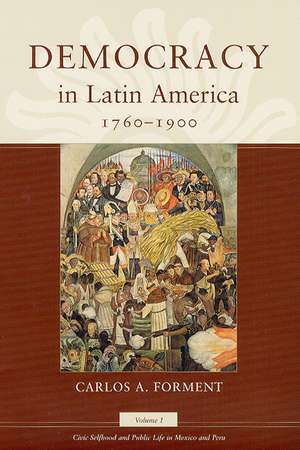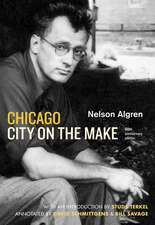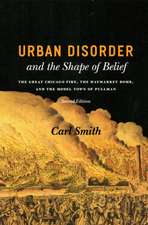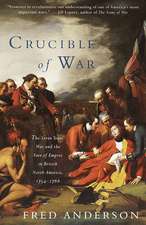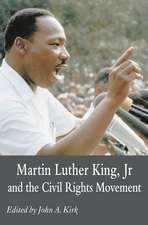Democracy in Latin America, 1760-1900: Volume 1, Civic Selfhood and Public Life in Mexico and Peru: Morality and Society Series, cartea 1
Autor Carlos A. Formenten Limba Engleză Paperback – 24 iul 2013
Carlos Forment's aim in this highly ambitious work is to write the book that Tocqueville would have written had he traveled to Latin America instead of the United States. Drawing on an astonishing level of research, Forment pored over countless newspapers, partisan pamphlets, tabloids, journals, private letters, and travelogues to show in this study how citizens of Latin America established strong democratic traditions in their countries through the practice of democracy in their everyday lives.
This first volume of Democracy in Latin America considers the development of democratic life in Mexico and Peru from independence to the late 1890s. Forment traces the emergence of hundreds of political, economic, and civic associations run by citizens in both nations and shows how these organizations became models of and for democracy in the face of dictatorship and immense economic hardship. His is the first book to show the presence in Latin America of civic democracy, something that gave men and women in that region an alternative to market- and state-centered forms of life.
In looking beneath institutions of government to uncover local and civil organizations in public life, Forment ultimately uncovers a tradition of edification and inculcation that shaped democratic practices in Latin America profoundly. This tradition, he reveals, was stronger in Mexico than in Peru, but its basic outlines were similar in both nations and included a unique form of what Forment calls Civic Catholicism in order to distinguish itself from civic republicanism, the dominant political model throughout the rest of the Western world.
This first volume of Democracy in Latin America considers the development of democratic life in Mexico and Peru from independence to the late 1890s. Forment traces the emergence of hundreds of political, economic, and civic associations run by citizens in both nations and shows how these organizations became models of and for democracy in the face of dictatorship and immense economic hardship. His is the first book to show the presence in Latin America of civic democracy, something that gave men and women in that region an alternative to market- and state-centered forms of life.
In looking beneath institutions of government to uncover local and civil organizations in public life, Forment ultimately uncovers a tradition of edification and inculcation that shaped democratic practices in Latin America profoundly. This tradition, he reveals, was stronger in Mexico than in Peru, but its basic outlines were similar in both nations and included a unique form of what Forment calls Civic Catholicism in order to distinguish itself from civic republicanism, the dominant political model throughout the rest of the Western world.
Din seria Morality and Society Series
-
 Preț: 185.66 lei
Preț: 185.66 lei -
 Preț: 185.22 lei
Preț: 185.22 lei -
 Preț: 292.67 lei
Preț: 292.67 lei -
 Preț: 233.50 lei
Preț: 233.50 lei - 5%
 Preț: 228.75 lei
Preț: 228.75 lei -
 Preț: 272.69 lei
Preț: 272.69 lei -
 Preț: 232.52 lei
Preț: 232.52 lei -
 Preț: 319.45 lei
Preț: 319.45 lei -
 Preț: 249.40 lei
Preț: 249.40 lei -
 Preț: 324.83 lei
Preț: 324.83 lei -
 Preț: 271.85 lei
Preț: 271.85 lei -
 Preț: 299.59 lei
Preț: 299.59 lei -
 Preț: 253.13 lei
Preț: 253.13 lei -
 Preț: 257.00 lei
Preț: 257.00 lei -
 Preț: 276.94 lei
Preț: 276.94 lei -
 Preț: 319.45 lei
Preț: 319.45 lei -
 Preț: 291.90 lei
Preț: 291.90 lei -
 Preț: 221.03 lei
Preț: 221.03 lei -
 Preț: 245.75 lei
Preț: 245.75 lei -
 Preț: 268.41 lei
Preț: 268.41 lei -
 Preț: 272.64 lei
Preț: 272.64 lei -
 Preț: 317.33 lei
Preț: 317.33 lei - 16%
 Preț: 211.52 lei
Preț: 211.52 lei - 14%
 Preț: 198.63 lei
Preț: 198.63 lei - 14%
 Preț: 197.31 lei
Preț: 197.31 lei - 22%
 Preț: 481.18 lei
Preț: 481.18 lei - 17%
 Preț: 153.17 lei
Preț: 153.17 lei
Preț: 278.60 lei
Nou
Puncte Express: 418
Preț estimativ în valută:
53.33€ • 57.94$ • 44.82£
53.33€ • 57.94$ • 44.82£
Carte tipărită la comandă
Livrare economică 21 aprilie-05 mai
Preluare comenzi: 021 569.72.76
Specificații
ISBN-13: 9780226101415
ISBN-10: 022610141X
Pagini: 488
Ilustrații: 9 maps, 19 figures, 11 tables
Dimensiuni: 152 x 229 x 30 mm
Greutate: 0.65 kg
Ediția:First Edition
Editura: University of Chicago Press
Colecția University of Chicago Press
Seria Morality and Society Series
ISBN-10: 022610141X
Pagini: 488
Ilustrații: 9 maps, 19 figures, 11 tables
Dimensiuni: 152 x 229 x 30 mm
Greutate: 0.65 kg
Ediția:First Edition
Editura: University of Chicago Press
Colecția University of Chicago Press
Seria Morality and Society Series
Notă biografică
Carlos A. Forment is the director of the Centro de Investigación y Documentación de la Vida Pública in Buenos Aires, Argentina.
Cuprins
List of Illustrations
Preface
Acknowledgments
PART ONE
INTRODUCTION
1. Common Sense and Democracy in Latin America Today
2. Social Equality and Political Liberty as Forms of Life
PART TWO
THE PUBLIC LANDSCAPE OF LATE COLONIAL LATIN AMERICA
3. Alone in Public: Institutional Practices and Colonial Life
4. Becoming a Rational Person: Anticolonial Movements and the Emergence of a Public
PART THREE
THE EMERGENCE OF CIVIC DEMOCRACY: BREAKING OLD HABITS
5. Crafting Citizens: Mexican Civil and Economic Society
6. Republic without Citizens: Peruvian Civil and Economic Society
7. Losing and Reclaiming Liberty: Mexican Political Society
8. Militarizing Sovereignty of the People: Peruvian Political Society
9. Learning a Language: The Mexican Public Sphere
10. Speaking in Tongues: The Peruvian Public Sphere
PART FOUR
THE DEVELOPMENT OF CIVIC DEMOCRACY: CREATING NEW FORMS OF LIFE
11. Living Democracy: Mexican Civil and Economic Society
12. Andeanizing Democracy: Peruvian Civil and Economic Society
13. Democratizing Antipolitics: Mexican Political Society
14. Fragile Democracy and Tattered Nationhood: Peruvian Political Society
15. Critical Deliberation: The Mexican Public Sphere
16. Opinion-Making: The Peruvian Public Sphere
CONCLUDING REMARKS
Rethinking Tocqueville: A Latin American Perspective
Index
Preface
Acknowledgments
PART ONE
INTRODUCTION
1. Common Sense and Democracy in Latin America Today
2. Social Equality and Political Liberty as Forms of Life
PART TWO
THE PUBLIC LANDSCAPE OF LATE COLONIAL LATIN AMERICA
3. Alone in Public: Institutional Practices and Colonial Life
4. Becoming a Rational Person: Anticolonial Movements and the Emergence of a Public
PART THREE
THE EMERGENCE OF CIVIC DEMOCRACY: BREAKING OLD HABITS
5. Crafting Citizens: Mexican Civil and Economic Society
6. Republic without Citizens: Peruvian Civil and Economic Society
7. Losing and Reclaiming Liberty: Mexican Political Society
8. Militarizing Sovereignty of the People: Peruvian Political Society
9. Learning a Language: The Mexican Public Sphere
10. Speaking in Tongues: The Peruvian Public Sphere
PART FOUR
THE DEVELOPMENT OF CIVIC DEMOCRACY: CREATING NEW FORMS OF LIFE
11. Living Democracy: Mexican Civil and Economic Society
12. Andeanizing Democracy: Peruvian Civil and Economic Society
13. Democratizing Antipolitics: Mexican Political Society
14. Fragile Democracy and Tattered Nationhood: Peruvian Political Society
15. Critical Deliberation: The Mexican Public Sphere
16. Opinion-Making: The Peruvian Public Sphere
CONCLUDING REMARKS
Rethinking Tocqueville: A Latin American Perspective
Index
Recenzii
“The historical evidence unearthed means the work constitutes important reading . . . not just for social and political theorists but also for historians of Latin America. . . . At times the author even begins to sound like Tocqueville."
“This impressive work of both research and theory deserves to be read widely by scholars of political culture in various disciplines. Like the best historical sociology, Forment’s book combines a synthesis of historiography on nineteenth-century Latin America with a provocative interpretation. . . . [The book] can serve as a bridge between South and North for all scholars interested in the historical development of democracy."
“A richly documented and immensely learned study of associational life in Mexico and Peru from 1760 to 1900. It compellingly shows that evidently vibrant civil societies did not always produce strong or stable democratic states. . . . [Forment’s] book challenges readers to reconsider most of what they think they already know about Latin America.”
“[This book] combines serious theoretical discussions in the opening and closing chapters with an incredible amount of data spread and analyzed throughout the central chapters. . . . [It] will undoubtedly become a central text in the discussion on democracy, not only in the area stuidied, but as a general topic.”
“In a style, for the most part, lively and engaging, Forment offers readers an exhaustively researched view of democracy from below, and shows how Mexico and, to a lesser extent, Peru have a rich democratic heritage to feed into current debates about governance.”
“Forment calls on a significant array of archival and periodical documentation to demonstrate the wide spectrum of social, economic, and political organizations by which Latin Americans engaged in participatory democracy, even in the absence of electoral democracy. . . . A refreshing view of identity- and nation-building that is rich in political sociology and theory.”
“Forment provides scholars and students of Latin America’s Middle Period with a challenging study of the nature and extent of democracy in what has generally been considered an authoritarian political landscape. . . . Forment’s creative and evidentially expansive approach employs scale and subject to rebut the commonly held historiographical wisdom that the postindependence world of politics and public life consisted of unstable government, authoritarian rule, and an exclusionary, personalist, and clientelistic politics. In scale, he digs down to the community and local level, relying on newspapers, essays, books, pamphlets, and other forms of published writing. In subject, he breaks public life down into civic, economic, and political components. . . . In making such a broad, innovative interpretation, boldness is required. Using an abundance of primary sources, Forment reveals a world of increasingly vibrant civic, associational life, and multistrata agency in nineteenth-century Mexico and Peru up to 1880.”
